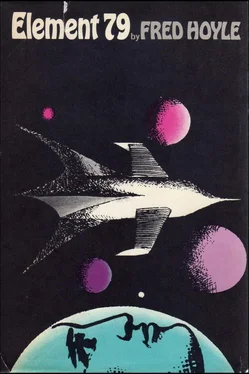I gave it up. The best I could see in Ling’s point of view was that her ideology represented a last link with Earth. Perhaps it was her way of keeping sane, but it was entirely beyond me to understand it. I was much more impressed at the way Ling always contrived to look neat, always in the same smock.
We were undereating, because unless you were actively hungry there was no point in consuming the tasteless vegetable marrow stuff. It was mushy with a lot of moisture in it. Even so, I was surprised we managed without needing to drink, for there was no possibility of drinking the one source of fluid, the liquid in the shower bath. I could only think we were generating a lot of water internally, by oxidizing the vegetable marrow material. Every now and then we had an intense desire to chew something really hard. I used to bite away at the cord from my rucksack, often for an hour at a time.
The natural effect of the undereating was that we were nearly all losing weight. I had lost most of the excess ten pounds or so which I never seemed to get rid of back on Earth. Ernst Schmidt had lost a lot more, so much in fact that he had discarded my anorak. He went around now only in the bathing trunks which he had tightened in quite a bit. Getting fit had become a passion with the German. He had taken to running through the passages according to a systematic schedule, ten laps from the cathedral and back again for every hour he was awake. Sometimes I accompanied him, to give my muscles a little exercise, but I could never be so regular about it. He commented on this one day.
“A strange difference of temperament, Professor. We often have these little runs together, but you can’t quite keep them up. Of course, I understand you have not the same need as I. But even if you had the need, you couldn’t keep them up. No, I think not.”
“Personal temperament?”
“It is an interesting question. Both personal and national, I think. A misleading thing in politics—and in business—is the description given to your people. Anglo-Saxons, eh? What is an Anglo-Saxon, Professor, a sort of German, maybe?”
“We’re always supposed to be a kind of first cousins. There’s the similarity of language, for one thing.”
“Accidental, imposed by a handful of conquerors. Look at me. I speak English, if you will pardon me, I speak it with an American accent. Does that make me an American? Obviously not. I speak this way because Americans have conquered my particular world, the business world.”
“Go on.”
“It is a pity we have no mirrors in this place. If we had a mirror, let me tell you how you would see yourself. You would see a tallish man, with a fair skin, a big red beard, and blue eyes. You would see a Celt, not a German. Your people are Celts, Professor, not Germans, and that is the true source of the difference in our temperaments, you and I.”
“So you think it goes a long way back?”
“Three thousand years or more, to the time when we Germans threw you Celts out of Europe. Yes, we understand a lot about each other, you and I, but we understand each other because we have fought each other for a long time now, not because we are the same.”
I was surprised at the turn of the conversation. Schmidt must have noticed something of this in my face. “Ah, you wonder how I can tell you these things? Because these things are my real interest, not the packing of meat, for who should be interested in the packing of meat?”
“What does all this lead you to?”
“We Germans can pursue a goal relentlessly to the end. You Celts can never do so. You have what I think is called an easygoing streak. It was this streak which made the Romans admire you so much in ancient times. But it was this weakness which very nearly cost you the whole of Europe, my friend.”
“To be easygoing can mean reserve, you know, reserve energy in times of real crisis.”
“All, you are thinking of winning the last battle. It was like that in each of the wars of this century, wasn’t it? You won the last battles, you won those wars. Yet from victory each time you emerged weaker than before. We Germans emerged each time stronger, even from defeat.”
“Because of a tenacity of purpose?”
“Correct, Professor.”
“What is it you are really telling me, Herr Schmidt? That in whatever should lie ahead of us, you will come out best?”
“A leader will emerge among us. It will be a man, an intelligent man. This leaves the choice between the two of us. Of the others, the one is a buffoon, the other a simple countryman. Which of us it will be, I am not sure yet.”
“Don’t be too easygoing, Herr Schmidt. You contradict yourself.”
Schmidt laughed. Then he became more serious.
“In a known situation, a German will always win. He will win because all his energies are directed to a clear-cut purpose. In an unknown situation, it is all much less sure.”
I mention these events in some detail because there were three points in them which came together. Hattie Foulds and her cockfights, Ling and the whipping she would have liked to administer on the person of Bill Bailey, and now Schmidt’s reference to himself as a meat-packer. It made a consistent theory, except for one very big snag, Daghri. I had a long serious talk with the Indian. He denied all my suggestions with such poise and dignity that I felt I simply must believe his protestations of innocence. My theory just had to be wrong. I became depressed about it. Mary noticed the depression, she wanted to know what it was all about. I decided to tell her of the things in my mind.
“Everyone of us is affecting an attitude, or considering some problem,” I began.
“How do you know? About me, for instance.”
“You are considering the moral problem of whether you should permit yourself to bear children into captivity.”
Mary looked me full in the face and nodded.
“My problem from the beginning,” I went on, “has been to understand something of the psychology of the creatures running this ship. Zoomen, is the way I like to think of them. What the hell are they doing and why? Obviously taking samples of living creatures, perhaps everywhere throughout the Galaxy.”
“You mean there might be animals from other planets on this ship?”
“Quite certainly, I would think. Through the walls of this cathedral, through the passage walls there will be other ‘quarters,’ other rooms and passages with other specimens in them.”
“Literally, a zoo!”
“Literally. Yet my curiosity about those other compartments and their contents is less than my curiosity about the human content of this particular compartment. There are nine of us, four of us from the British Isles, an American girl, a Chinese girl, an Indian, a German, and an Australian. What kind of a distribution is that? Seven out of nine white. Can you really believe interstellar zoomen have a color prejudice?”
“Perhaps it wasn’t easy to grab people, they took the first they could get.”
“Doesn’t hold water. Geographically, they snatched us from places as wide apart as Europe, America, India, Australia, and China. They snatched McClay, Daghri, and myself from the quiet countryside, they took you from the busy streets of London, Ling from a crowded town, Schmidt and Giselda Horne from the suburbs of Chicago. It doesn’t seem as if the snatching process presented the slightest difficulty to them.”
“Have you any idea of how it was done?”
“Not really. I just visualize it like picking up bits of fluff with a vacuum cleaner. They simply held a nozzle over you and you disappeared into the works.”
“To come out in this place.”
“It must have been something like that. Where had we got to, this color business. Differences in color might seem very unimportant to these zoomen. We only see these differences, like the differences between you and Ling, because an enormous proportion of the human brain is given over to the analysis of what are really extremely fine distinctions. It could be the zoomen hardly notice these distinctions, and if they do they don’t think them worth bothering about.”
Читать дальше












